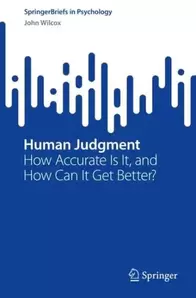|
John Wilcox is adjunct professor of psychology at Columbia University and the founder of Alethic Innovations. He was formerly visiting scholar at Stanford University where he also obtained a PhD covering topics across philosophy, psychology and political science. In 2022, he published the book, "Human Judgment: How Accurate Is It, and How Can It Get Better?" (Springer Nature).
Praise for "Human Judgment":
The book can be downloaded or purchased in hard copy here. |
Social media links
TWITTER - mastodon
AREAS of Specialization
Cognitive Psychology & Epistemology
Much of John’s research revolves around human cognition—especially the question of how to improve human reasoning. The hope is that improving reasoning will improve decision-making and, ultimately, the quality of our lives as individuals and as a collective.
Selected publications in cognitive psychology and epistemology:
- His book "Human Judgment" (Springer Nature, 2022)
- Journal article detailing experiments illustrating a new bias and an approach to correct it
Metascience & Philosophy of Science
John also works in philosophy of science and metascience. He regularly reviews academic work for publishers such as the Cambridge University Press, the British Journal of Philosophy of Science and others, and he has made novel contributions to the philosophy of science.
Selected publications in metascience and philosophy of science:
- Stanford Encyclopedia entry on the reproducibility of scientific results, including the metascience of the reproducibility crisis
- Journal article articulating and proving new normative Bayesian constraints on scientific reasoning
|
|
Moral Psychology & Ethics
John also explores moral psychology and ethics. He is also the co-director and lead researcher at an interdisciplinary research team called The Metachangemakers Project. The project focuses on how to cultivate changemakers—that is, people with the motivation and competencies to make a positive impact on the world, to contribute to collective wellbeing and to address societal challenges. His innovations in this space also include developing a new solution to the so-called “moral twin earth problem” in metaethics (under review). You can learn more about metachangemaking from his team’s presentation at the first Life Improvement Science conference (to the left). |
